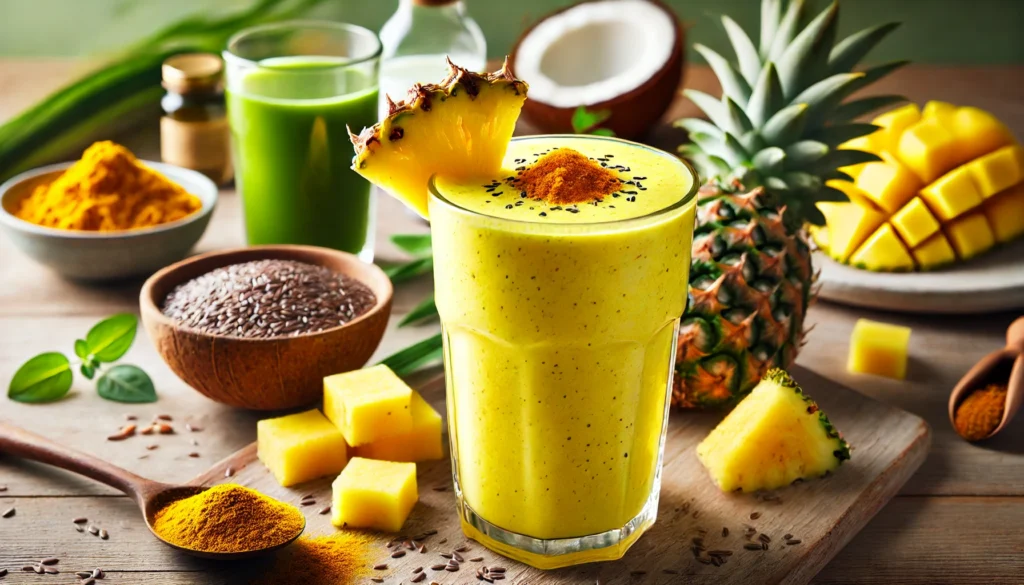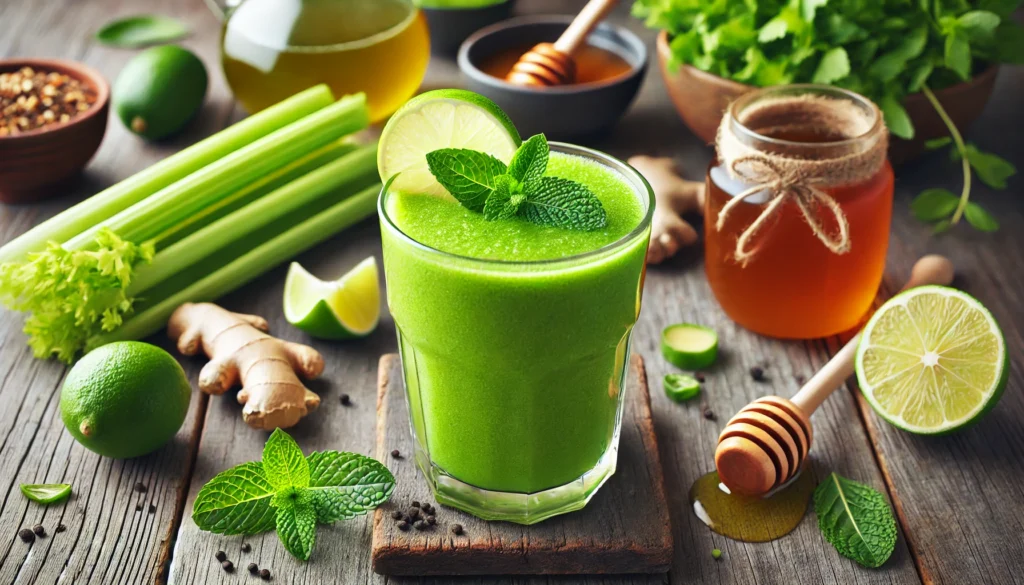Gut inflammation can contribute to bloating, discomfort, and digestive issues that affect overall well-being. One of the most effective natural remedies for reducing gut inflammation is green tea, a powerful anti-inflammatory and antioxidant-rich ingredient. Green tea contains polyphenols, catechins, and epigallocatechin gallate (EGCG), compounds known for their ability to calm inflammation, support digestion, and promote a balanced gut microbiome.
In this article, we’ll explore five delicious green tea-infused smoothie recipes designed to reduce gut inflammation while delivering essential nutrients. These smoothies combine green tea with fiber-rich, anti-inflammatory ingredients to create blends that support digestive health and overall wellness.
1. Green Tea & Banana Gut-Soothing Smoothie
A creamy, nutrient-dense smoothie that calms the digestive system and supports gut health.
Ingredients:
- 1 frozen banana (provides prebiotic fiber to support healthy gut bacteria)
- 1 cup brewed and cooled green tea (anti-inflammatory and rich in antioxidants)
- ½ cup plain Greek yogurt (rich in probiotics for gut balance)
- ½ teaspoon turmeric (reduces inflammation and supports digestion)
- ½ teaspoon cinnamon (anti-inflammatory and helps regulate digestion)
- 1 teaspoon honey (optional, for natural sweetness)
- ½ cup ice
Instructions:
- Add all ingredients to a blender.
- Blend until smooth and creamy.
- Pour into a glass and enjoy immediately.
Why it works:
Green tea and turmeric reduce inflammation, while banana provides prebiotic fiber to support gut bacteria. Greek yogurt introduces probiotics, making this a perfect smoothie for soothing the digestive tract.
2. Green Detox Tea Smoothie
A fiber-rich, cleansing green smoothie designed to flush out toxins and support digestion.
Ingredients:
- 1 cup spinach (fiber and chlorophyll for detoxification)
- ½ cucumber (hydrating and soothes digestion)
- ½ green apple (provides prebiotic fiber)
- 1 cup brewed and cooled green tea (anti-inflammatory and supports gut health)
- Juice of ½ lemon (stimulates digestion and detoxifies)
- ½ teaspoon grated ginger (reduces bloating and inflammation)
- 1 cup coconut water (natural electrolytes for hydration)
- ½ cup ice
Instructions:
- Add all ingredients to a blender.
- Blend until smooth and well combined.
- Serve chilled and enjoy.
Why it works:
Leafy greens, apple, and coconut water hydrate and cleanse the digestive tract, while green tea and ginger reduce inflammation and promote gut healing.

3. Tropical Green Tea & Pineapple Gut-Healing Smoothie
A refreshing, enzyme-rich smoothie that aids digestion and reduces gut inflammation.
Ingredients:
- 1 cup fresh or frozen pineapple chunks (contains bromelain, an enzyme that supports digestion)
- ½ banana (adds prebiotic fiber and creaminess)
- ½ cup coconut milk (supports gut lining and digestion)
- 1 cup brewed and cooled green tea (provides antioxidants and reduces inflammation)
- ½ teaspoon flaxseeds (provides fiber and omega-3s)
- ½ teaspoon turmeric (anti-inflammatory and gut-soothing)
- ½ cup ice
Instructions:
- Place all ingredients in a blender.
- Blend until smooth and creamy.
- Pour into a glass and enjoy.
Why it works:
Pineapple’s bromelain supports digestion, while green tea and turmeric help reduce gut inflammation. Coconut milk nourishes the gut lining, and flaxseeds provide fiber to support regular digestion.
4. Green Tea & Berry Antioxidant Smoothie
A delicious, berry-packed smoothie loaded with antioxidants to combat gut inflammation and support digestive health.
Ingredients:
- 1 cup mixed berries (strawberries, blueberries, raspberries)
- 1 cup unsweetened oat milk (prebiotic-rich and gut-friendly)
- 1 cup brewed and cooled green tea (reduces oxidative stress and gut inflammation)
- ½ teaspoon chia seeds (fiber-rich and supports digestion)
- 1 tablespoon almond butter (healthy fats for gut support)
- ½ teaspoon vanilla extract (adds natural sweetness)
- ½ cup ice
Instructions:
- Add all ingredients to a blender.
- Blend until smooth and creamy.
- Serve chilled and enjoy.
Why it works:
Berries provide antioxidants and fiber to reduce gut inflammation, while green tea protects against oxidative stress. Chia seeds and oat milk support a healthy gut microbiome, making this smoothie ideal for long-term digestive wellness.
5. Green Tea & Ginger Digestive Reset Smoothie
A refreshing, digestion-boosting smoothie designed to soothe the gut and promote microbial balance.
Ingredients:
- 1 cup unsweetened green tea (rich in catechins and supports digestion)
- ½ cup celery (provides fiber and hydration)
- ½ teaspoon grated ginger (reduces bloating and inflammation)
- Juice of ½ lime (enhances liver function and digestion)
- ½ teaspoon raw honey (soothes the gut and promotes beneficial bacteria)
- 5-6 fresh mint leaves (relieves bloating and promotes digestion)
- ½ cup ice
Instructions:
- Add all ingredients to a blender.
- Blend until smooth and well combined.
- Serve immediately and enjoy.
Why it works:
Green tea, ginger, and lime juice work together to reduce gut inflammation and support digestion. Celery provides hydration and fiber, while honey promotes gut-friendly bacteria, making this a powerful gut-healing smoothie.

Why Green Tea for Reducing Gut Inflammation?
Green tea is rich in polyphenols, especially EGCG (epigallocatechin gallate), which helps reduce gut inflammation, protect against oxidative stress, and promote a balanced microbiome. It supports digestion by improving gut motility, reducing bloating, and calming the intestinal lining. Additionally, green tea’s antibacterial properties help maintain gut health, making it an excellent ingredient for soothing and protecting the digestive system.
Incorporating Anti-Inflammatory Smoothies into Your Routine
Drinking green tea-infused smoothies regularly can help reduce gut inflammation, improve digestion, and support a healthy microbiome. To maximize their benefits, drink them on an empty stomach to allow antioxidants to work effectively, use a variety of fiber-rich ingredients, and stay well-hydrated to support digestion. These smoothies provide a delicious, natural way to reduce gut inflammation and maintain long-term digestive wellness.
Further Reading:
Green Tea and Its Relation to Human Gut Microbiome
Tea Compounds and the Gut Microbiome: Findings from Trials and Mechanistic Studies
The content provided on Smoothie Professor is for informational and educational purposes only and is not intended as medical advice, diagnosis, or treatment. Readers are encouraged to consult a qualified healthcare professional before making any changes to their diet, exercise routine, or lifestyle, particularly if they have existing health conditions or specific dietary needs. While every effort is made to ensure the accuracy of the information presented, Smoothie Professor and its contributors do not guarantee the completeness, reliability, or suitability of any information or recipes for individual needs. Use of the content is at your own risk, and Smoothie Professor expressly disclaims liability for any adverse effects, claims, or damages arising from the use of the information or recipes provided on this website.
